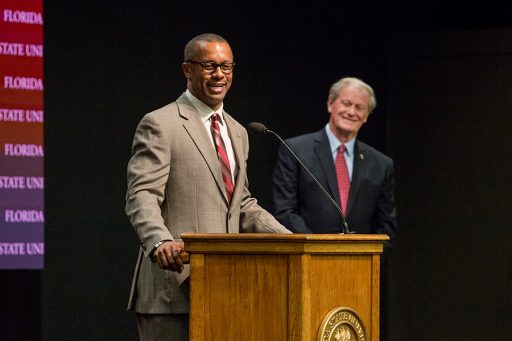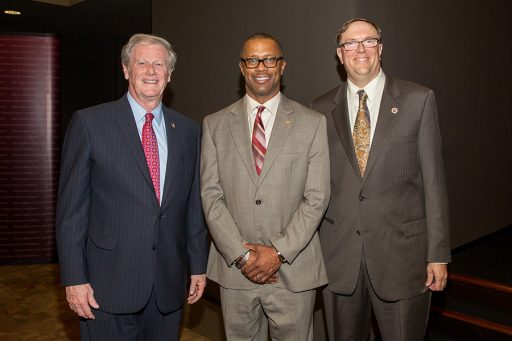After a year of unprecedented success, President John Thrasher urged the Florida State University community to continue moving forward as it looks toward the future.
Thrasher delivered his annual State of the University address to the Faculty Senate on Wednesday, Dec. 6, just hours after introducing Willie Taggart as the Seminoles’ new football coach. Taggart made a guest appearance at the event, stressing his commitment to student success.
The university climbed five places for the second consecutive year in the U.S. News & World Report rankings, brought in a record amount of funding from the National Institutes of Health and won national awards for its campus diversity and internationalization. Thrasher expressed confidence that Florida State will continue its rise in national prominence.
“Our vision is clear, and we won’t lose sight of our goals,” Thrasher said. “Becoming a Top 25 public university is now well within our reach, and I know we will get there.”

Florida State, currently ranked No. 33 among public universities, has made incredible strides toward its goal of cracking the Top 25. No other public university in the U.S. News & World Report’s Top 50 has moved up 10 spots in the rankings over the past two years.
“We did it because we chose to invest in the heart and soul of this university: our students and in you — our faculty,” Thrasher said. “We believed that if our priorities were in the right place, the rankings would follow — and they have.”
Florida State’s investment in faculty hiring and compensation has paid dividends, improving key areas that affect the rankings: faculty compensation, class size and student-faculty ratio. Now, the university is also in the process of hiring 125 new faculty members in addition to replacing those current faculty who retire or leave.
“This is the single largest hiring initiative in our history and is one of the most important things we can do to increase our success in every aspect of the university,” Thrasher said.
FSU’s focus on student success, as outlined in the strategic plan, is the driving force behind the university’s ascent in the rankings, Thrasher said. FSU’s 4-year graduation rate places in the Top 20 nationally, and its 93 percent freshman retention rate ranks 18th in the country.
“It’s no wonder FSU is becoming increasingly popular among parents and prospective students,” Thrasher said. “Although the application deadline is not until February, I’m excited to tell you we have already outpaced last year’s record. As of Nov. 1, we have received applications from 43,000 students all vying for about 6,500 spots in next year’s freshman class.”
Florida State is also making headway on its goal to amplify its excellent research programs, particularly in the areas of health and biomedical research. Researchers in nursing, medicine and other health-related areas brought in record funding of $35.8 million from the National Institutes of Health in Fiscal Year 2017 — more than double the amount the university received five years ago.

“Even more impressive, you — our faculty researchers — have brought in more than $1 billion over the past five years in federal, state and private contracts and grants,” Thrasher told the faculty.
Diversity and inclusion has been a priority for Thrasher throughout his presidency. This year, Insight into Diversity once again recognized Florida State as a Diversity Champion, and the publication also presented FSU with the Higher Education Excellence in Diversity Award for the fourth year in a row. Last month, FSU accepted the 2017 Senator Paul Simon Award for Campus Internationalization, one of only four institutions in the country to receive the honor.
“I truly believe that a diverse and inclusive environment enhances the educational experience for everyone and prepares our students to thrive in an increasingly multicultural and multifaceted world,” Thrasher said.
Thrasher also addressed the many challenges the university has faced over the past year — from issues like the travel ban and DACA to the university’s policy on campus namings and recognitions to being thrust into the national spotlight last month with the tragic death of a 20-year-old fraternity pledge and Florida State’s subsequent suspension of Greek life activities.
“All of the challenges of the past year have provided us with an opportunity to reaffirm our values and take positive steps toward an even stronger, healthier and more inclusive university,” Thrasher said.
As Florida State looks toward the future, it will request $90 million from the Florida Legislature when the 2018 Session begins in January to support the university’s efforts to hire world-class faculty and scholars, advance its professional and graduate degree excellence, support its preeminence and maintain its facilities.
FSU is also asking the Legislature for about $75 million for new facilities on campus, including funds to complete the EOAS Building, as well as continued funding for the College of Business’ Legacy Hall, the Interdisciplinary Research Commercialization Building, a STEM Teaching Lab and new funding for the FAMU-FSU Joint Use Engineering Building.
“I feel cautiously optimistic about the upcoming session because our lawmakers know that Florida State is one of the most efficient universities in the country, and they understand that supporting Florida State students and faculty is a wise investment in the future,” Thrasher said.
Following another year of outstanding accomplishments, Thrasher encouraged the FSU community to build on the university’s positive momentum.
“It’s been said that if everyone is moving forward together, then success takes care of itself,” Thrasher said. “So, together, let’s keep moving forward. I’m excited about the future because the future is Florida State.”
To view the archived webcast of the State of the University address, visit http://learningforlife.fsu.edu/state-of-the-university-17/.




